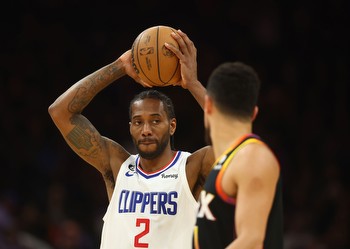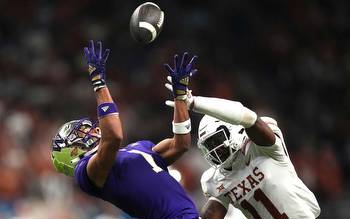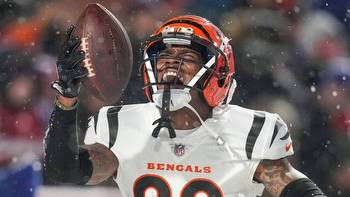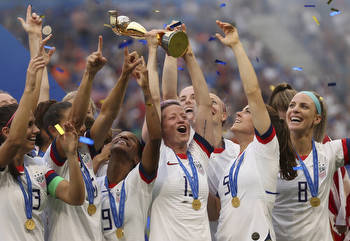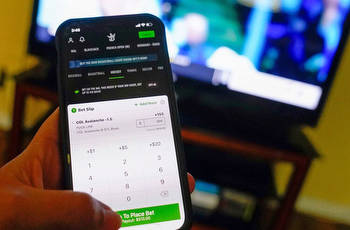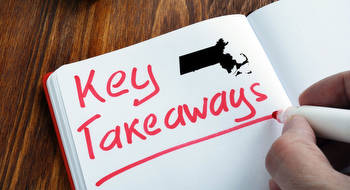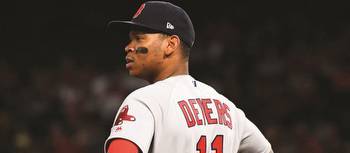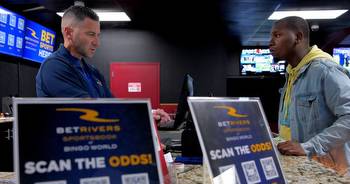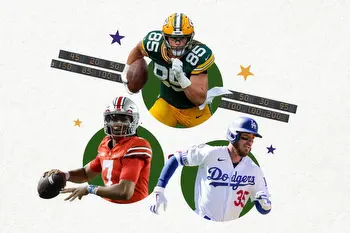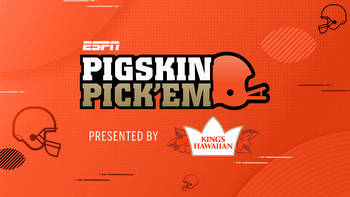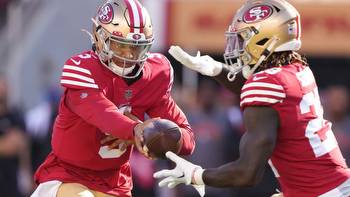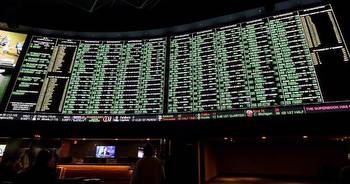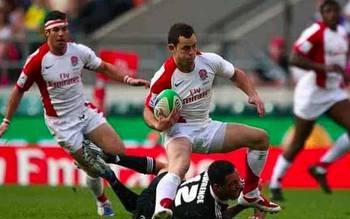Miller: 'Gambling Is About Finding People Willing To Lose To You'
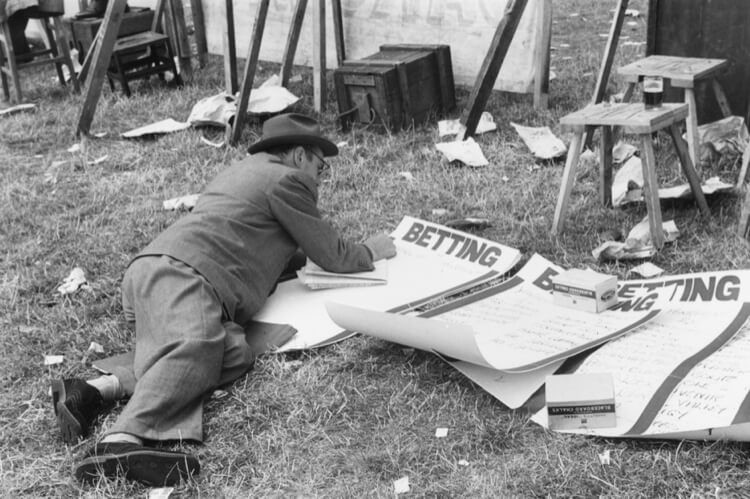
Splashy titles aren’t Ed Miller’s thing.
Miller and his co-author and business partner, Matthew Davidow, have a new book out called Interception: The Secrets of Modern Sports Betting. The part before the colon makes that exponentially more colorful than the name of their 2019 debut, The Logic of Sports Betting.
But what sounds like a textbook isn’t a textbook. Miller and Davidow’s 192-page tome is pleasingly economical, informative, and witty. They’re not outwardly dissing modern sports betting apps and their operators, but inwardly? You be the judge.
Here is Sports Handle‘s email Q&A with Miller:
Mike Seely: This book covers a ton of ground in an extremely efficient, entertaining manner. The most fascinating theme, to me, was in your advice to bettors who aspire to beat modern sportsbooks without getting severely limited or booted. In essence, you’re telling them how to look, bet, and act like a losing recreational bettor in order to stick around and win over the long run, which means they’ll need to pass on low-hanging fruit and somewhat intentionally lose from time to time to maintain that charade. Doesn’t this seem like a lot to ask from someone who has a system they believe in and is wired to win?
Ed Miller: To be clear, I don’t ask this of anyone. It’s very hard to do this. Most either never think to try or, as you say, aren’t wired for it. I’m personally not really wired for it.
Having said that, gambling is about finding people who are willing to lose to you. The most reliable way to do that — whether you’re in a pool hall, on a golf course, in a poker room, or at a sportsbook — is to use a little misdirection to make yourself look like the sucker.
MS: Volume is central to any winning bettor’s strategy, but couldn’t a high bet volume alone get someone flagged as a potentially sharp bettor who’s in line to be limited?
EM: Not really, no. Sportsbooks want high-volume bettors. If you continue the whole “not losing” thing indefinitely, then of course that will eventually get you flagged. But not the volume by itself.
MS: I’m not much of a math person, and there are some nice tips in your book for how people like me can occasionally beat the books while suffering from this tragic intellectual deficiency. But at the end of the day, is it fair to say that mathematically inclined individuals are more successful sports bettors, to the point where that’s more important than intimate knowledge of a given sport?
EM: Gambling math is a core skill. But that’s mostly arithmetic. Stuff like being able to flip back and forth between odds and break-even percentages, being able to compare prices in multiple places quickly (perhaps quoted in slightly different formats), having a feel for what the relationships between related bets should be (i.e., first-half lines versus full-game lines). More advanced math, like statistical modeling or machine learning or the like, I think is a more niche skill. Sure, it’s also valuable, but intimate knowledge of the sport is, I think, an equally important niche skill. My guess (purely a guess here) is the majority of people who win at sports betting lean more heavily on sports knowledge than they do advanced math.
MS: You’ve been in the business of being a third-party content provider, yet you’re quite critical of the relationship between sportsbooks and third-party content providers, insofar that the former party often doesn’t apply the proper scrutiny to the latter before cutting a deal. In an ideal arrangement, what sort of checks and balances should be in place to ensure that a new market or product doesn’t come limping out of the gate?
EM: I could write an entire new book to answer that one. I think it’s fair to assume no one reading this Q&A wants to read that book, so I’ll just drop my biggest pet peeve. The industry tends to use “hold percentage” as a proxy for odds quality, but hold percentage is a terrible metric. It’s like using wins to evaluate a starting pitcher.
Say I represent a third-party content provider who is trying to sell in-play five-a-side pickleball odds to a large modern sportsbook. Sports betting odds are predictions. If I publish odds of -150 for the Dallas Dills to win a game, then I’m implicitly saying that I think the Dills will win the game about 60% of the time. (Actually a bit less, like 57%, because there’s vig on the market.)
If you’re a sportsbook buying my odds, then presumably you’d want to make sure my predictions are pretty good, right? But if you’d presume that, then you’d presume wrong.
Sportsbooks tend to make no effort whatsoever to verify that an outcome predicted to occur 60% of the time actually occurs around 60% of the time. Instead, they just ask, “What’s the hold percentage?” That is, “What percentage of the dollars bet into your markets have the bettors lost to the sportsbooks who are already your customers?”
The reason this metric sucks is because it’s highly dependent on all sorts of things that have nothing to do with how good a prediction 60% is. For one, it depends heavily on how skilled (or unskilled) the gamblers are who have bet into the odds. Which odds do you think are better, odds that hold 5% against clueless bettors or odds that hold 1% against the best gamblers in the world? The (I hope obvious) answer is that 1% against the best gamblers in the world is, by far, better. But the industry by and large says, “5 percent bigger than 1 percent, therefore 5 percent better.”
Hold percentage also directly depends on how frequently people place the bets into parlays. This doesn’t represent any true insight; it’s purely based on the mathematical definition of hold percentage. So if people just happen to like to throw my five-a-side pickleball markets into their parlays, that will inflate my hold percentage completely independently of how good the odds are. Bottom line, hold percentage is essentially a useless metric for what the industry is trying to use it for. I wish they’d take the time to try to evaluate the quality of the predictions themselves.
MS: Your book drives home the point that most modern U.S. sportsbooks value quantity (number of markets they can offer) over quality in pricing. Do you think that there will come a point where that value system flips and what would it take to precipitate such a 180?
EM: I like to think so, but who knows? I’m bad at predicting the future. Well, I can come up with a reasonable estimate for how likely a team will be to win a football game, but predictions for chaotic, open-ended systems that depend on mass human behavior, not so much.
Having said that, I think (hope) so, and my argument would be that at some point, expanding the betting menu offers diminishing returns. Bettors like to be able to bet on lots of different stuff, for sure, but at some point it’s like enough, you know? And at that point, how do you offer more value to your bettors? I think you do it by intelligently curating the bets you offer so you’re constantly surfacing the bets the bettor most wants to make. In my mind, that looks like smaller, “quick” betting menus with personalization and where everything the bettor sees “just works.” (No delays, suspended markets, errors, etc.)
MS: Someone I trust in the industry once told me the ideal sportsbook would be one that featured fair pricing on a limited number of markets and engaged in no paid marketing or promotions. Prime Sports seems to be putting that theory to the test in the Ohio sports betting market. What do you make of this notion and, taken a step further, how would you run a modern U.S. sportsbook if you had carte blanche?
EM: I don’t think there’s one right way to run a sportsbook. I think there are niches in the market, and there’s room for different operators to cater to the different niches. I like what Prime Sports is doing, as I think they are catering to a customer niche that is otherwise not currently served in the U.S. But I think FanDuel, just to use them as an example, is serving a different niche and doing it extremely well. I tend to think about the question as, “What customer niche is currently unserved, what do they need or want, and how would I build that?” I definitely have some thoughts about that.
MS: In your opinion, is it possible for an individual or betting syndicate to make a comfortable, sustainable living betting exclusively at legal, domestic U.S. sportsbooks and, if so, how would such an operation fly under the radar?
EM: I don’t think anything in gambling is “sustainable.” There are just opportunities, and all gambling opportunities are temporary. Some last longer than others. I think there’s clearly an opportunity today. I couldn’t predict how long it may last.
MS: Specific to in-game betting, how much longer do you think it will take for the latency issue to be resolved to a point where bettors and sportsbooks are on relatively equal footing?
EM: Anytime you ask me to predict the future, the only fair thing I think I can say is that I don’t know. I think it will get better over time. What that timeline looks like, I simply don’t know. Also, the present latency is more of a problem for some sports versus others and some types of bets versus others.
MS: In the book’s conclusion, you write, “We hope we’ve inspired regulators to examine the express and implied promises that modern sportsbooks make to their customers and perhaps to ensure that sportsbooks live up to those promises more often.” What, specifically, are you getting at here in terms of regulations that could be implemented to help sportsbooks keep these promises?
EM: Again, I could write a whole book on this topic, so I’ll just pick one idea here. I would like to see the palpable error rule clarified in regulation. The palpable error rule is where the sportsbook retroactively alters or voids placed bets with the claim that the bets were offered in “clear” error. From a combined industry health and customer rights perspective, I think there is both an obvious need for this mechanism and an equally obvious risk for abuse of it. Just the thing a regulator could step in to clarify.
“A sportsbook can use the rule in these circumstances. A sportsbook cannot use it in those. And a sportsbook may use it no more than X times in Y time period, and if it exceeds these limits it will be subject to fines.” Something like that feels right in order to protect both sportsbook and customer.
MS: I’m not sure if you’ve thought about a third installment of your betting book series, but if you had to predict what it might focus on or consist of, what would your forecast be?
EM: Another prediction, huh? Well, at least I have control over this one. Matt and I have thought about writing a book on sports statistical modeling. So maybe that one? But we don’t have any immediate plans to write another one.









